
[ad_1]
Game Developer Deep Dives are an ongoing sequence with the objective of shedding mild on particular design, artwork, or technical options inside a online game in an effort to present how seemingly easy, elementary design choices aren’t actually that easy in any respect.
Earlier installments cowl subjects akin to designing fight to match the beat of music in Metal: Hellsinger, gamifying the method of studying to code with One Dreamer, and curating significant selections in multiplayer narrative video games in Doomsday Paradise.
In this version, Aureus Morale of Moral Anxiety Studio discusses Roadwarden, explaining how the sport’s programs created variance and significant impression.
I’m Aureus and I designed, wrote, programmed, and illustrated Roadwarden, the primary profitable recreation developed by my Moral Anxiety Studio. While I used to be working, I had a uncommon luxurious in disguise. I used to be including new items of content material to the sport with out the necessity to justify myself, or to separate the duties between the crew members, nor preserve the circulation of communication and documentation. And for the reason that majority of the undertaking is text-based, making even grand-scale adjustments and fixes took me not than a number of days, and often only a few hours.
For groups of builders with superior visuals, such a situation just isn’t replicable. I’ll put apart private examples and anecdotes, and stick with the toolbox I used as I attempted to meet my goal: making an RPG that notices and displays the participant’s role-playing.
To be extra particular, I used to be pursuing a recreation that feels responsive, adjustable, avoiding epic linear tales that abruptly shift right into a single “save everyone / become powerful” resolution within the epilogue. I imagine that making significant selections at completely different levels of the participant’s journey is likely one of the most vital experiences that RPGs have to supply, and my recreation was meant to maintain these within the foreground, compromising extra advanced programs to present gamers entry to the entire quests, occasions, and conversations, irrespective of their character’s ability set.
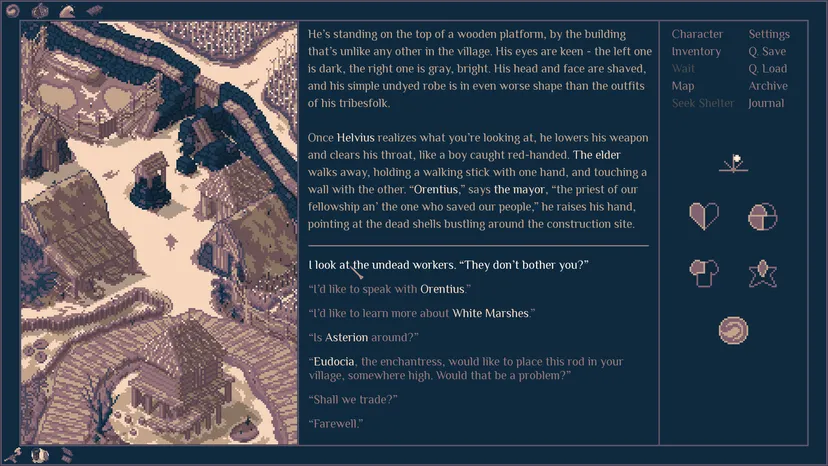
The construction and the alembic
While the main choices in Roadwarden require deciding on particular strains of textual content throughout dialogues or different interactions, the sport includes many extra selections that aren’t as dramatic, however have nice impression on one’s expertise. Not in contrast to in combat-oriented RPGs, the participant makes selections concerning the methods they spend cash, which objects they use, and which stats they prioritize.
Of nice significance is the order by which the participant reaches new areas and speaks with NPCs. One participant’s beginning village can be one other’s final visited settlement. I needed to supply the liberty to journey as one pleases, and due to this fact I wanted to make every settlement considerably recent, but in addition open to the newcomers, giving it a understandable construction—the introduction, the preliminary mistrust, lower-difficulty quests that encourage the protagonist to discover the world additional, and eventually extra superior quests and extra helpful interactions.
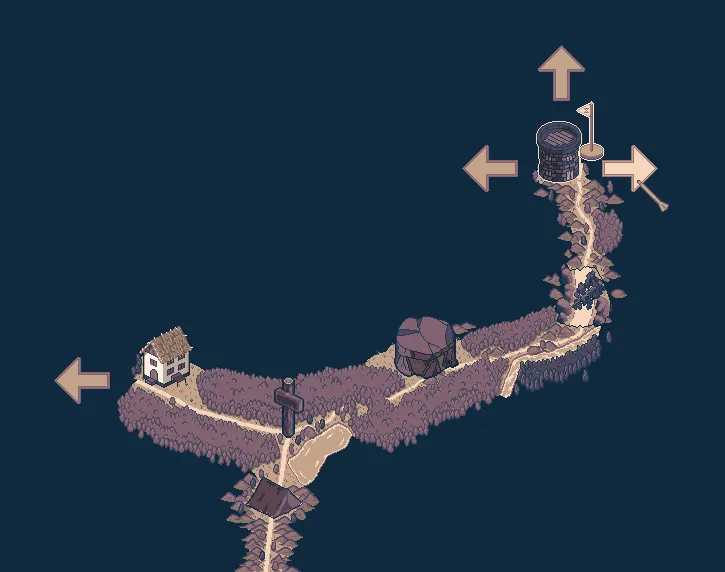
Having so many attainable instructions, I wanted to simplify as a lot as I might. I had divided the interactions into ones that have been hand-crafted of their entirety, and ones that might do with the alembic. By this, I imply that the participant wouldn’t be compelled to stay to the predetermined order of duties, and as an alternative could be required to succeed in an quantity of factors tied to a pre-established threshold of success. Because of this, the participant might attain the subsequent a part of a quest whereas sustaining some quantity of freedom.
The most simple strict quest would require the participant to go to a selected place, do a selected interplay, and return to the hunt giver. The quests utilizing the alembic
are a bit tougher to elucidate. A superb instance could be the one which requires the participant to feed the darkish altar with magic. They can use blood, spells, or magical objects, and even fail different quests within the course of, however it doesn’t matter what they put into the alembic, it distills the entire choices into +1s, +2s, and so forth, till the specified threshold of completion is reached.
The alembic helped me manage and preserve the sport’s grand construction. If a PC wants to finish three out of 5 completely different interactions to progress a quest, and these interactions are unfold throughout your entire map, it permits me to tempo the hunt relying on how straightforward it’s to succeed in and full these interactions. The early recreation encourages the participant to observe the principle roads and to go to all the main settlements. The midgame closes most quests, together with those that contain better information of the sport’s programs. The late recreation includes essentially the most troublesome, dramatic quests and interactions, typically concluding a narrative that had began hours earlier.
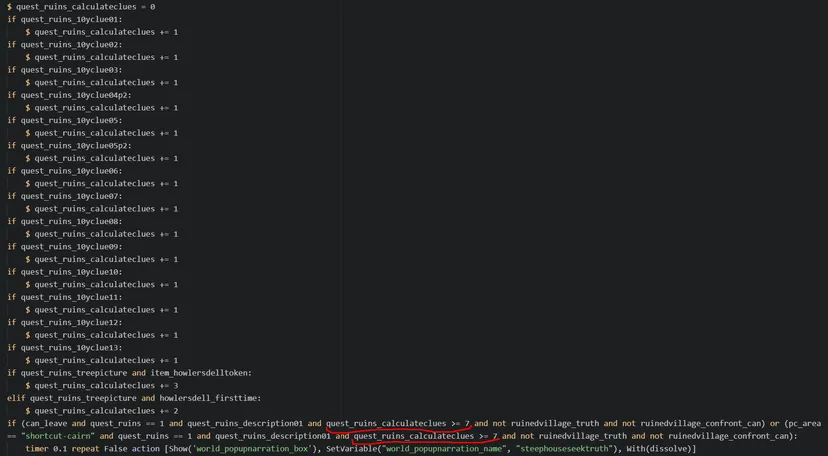
Over the course of the sport, the protagonist gathers friendship factors which are in contrast towards arbitrary belief thresholds. As the participant places extra effort into interacting with NPCs, they unlock new interactions, quests, and hints, advancing the tales, nevertheless it’s additionally a camouflaged character development. Many of the rewards open new alternatives—shelters, higher costs, free companies. Both the friendship factors and the belief thresholds are hidden from the participant, although the adjustments in a relationship are sometimes expressed with the way in which characters greet or handle the protagonist, including to the extra vital shifts of the grayed-out dialogue choices into interactable ones.
In the worst-case situation, it results in awkward outcomes when the protagonist befriends a whole stranger in 5 to 10 minutes, or meets offended scowls as they ask for assist though they only participated in a pleasant change.
There are methods to restrict these jarring moments. Having a low friendship stage can increase level positive aspects, and I launched exceptions and extra nuanced interactions that both decrease belief thresholds or drive NPCs to return the favor (or admit that they’ve been mendacity). At the identical time, having a excessive popularity in a village provides to the friendship with an NPC, and vice versa.
Using the alembic feels unavoidable to me on a large-scale undertaking, and the perfect I might do is attempt to keep away from gamifying such interactions an excessive amount of. Some video games, for instance, introduce “gift” programs that flip one’s enemies into lovers after showering them with loot. In Roadwarden, such conditions are minimized.

The fluff, the spice, the floodgates, the burnt bridges
It could be insane to make every resolution memorable and of comparable significance. Not that it’s one thing anybody needs—pacing is vital, and maintaining every factor stressfully essential and epic would result in exhaustion, making the tales style the identical.
I allowed myself to place completely different ranges of significance onto numerous sections of the sport, beginning with the fluff—interactions that don’t affect the tales however are supposed to pull the participant into the sport’s world. Some of those function a vibe verify, permitting the participant to state immediately what their character thinks a few particular state of affairs, character, or place, in hopes that it’s going to flesh out the protagonist.
Other fluff items helped me restrict the sport’s purple prose, changing lengthy, detailed narration by giving the participant a possibility to pick out which element concerning the world feels most becoming for them. For instance, as an alternative of explaining how there are numerous tales tied to numerous cultures, the sport lets the participant decide a obscure story concerning the moon, concurrently giving the style of the sport’s inhabitants, and of the character’s background or persona.
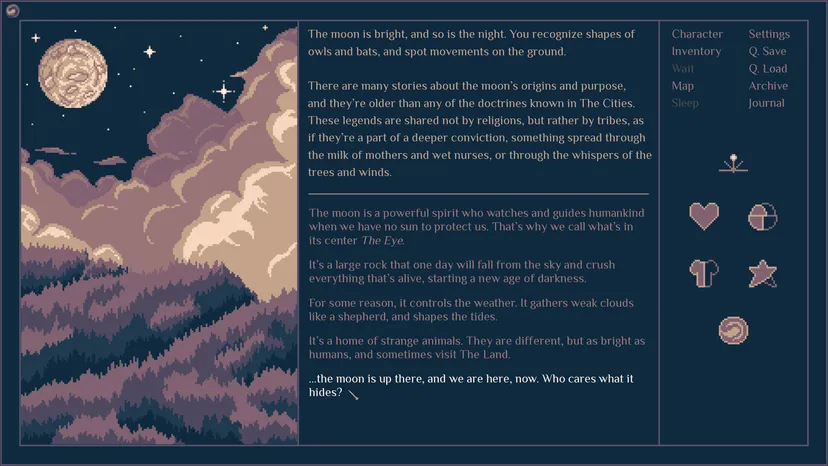
Sometimes, the sport remembers the chosen fluff, referencing it additional down the street. Once the participant reaches the sport’s closing part, the options of the town they go to are affected by the alternatives made whereas describing it to NPCs.
The spice impacts the sport extra immediately. Such selections stay minor however have better significance in the case of gaining friendship factors or affecting the character’s stats. The most notable examples are the perspective scenes. They happen when the protagonist meets NPCs of better significance.
The participant is supposed to pick out one of many 5 completely different approaches (pleasant, playful, distanced, intimidating, susceptible) whereas introducing themselves. Some of those attitudes
result in comparable outputs, whereas others differ considerably, rising or reducing the friendship stage, providing new clues, or giving on the spot entry to quests or interactions which are often unlocked in a while.
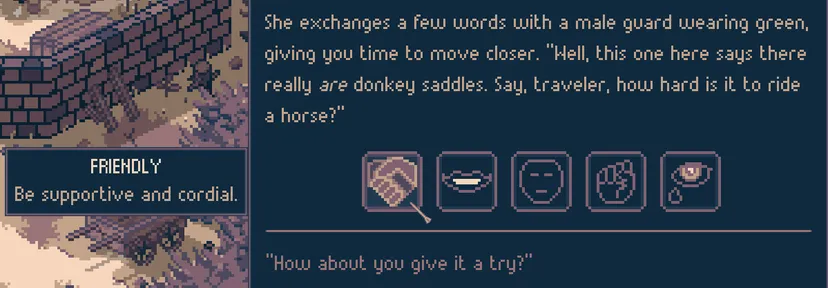
The spice moments are extra gamified than the fluff, and due to this fact the extra helpful selections get extra clear because the participant collects extra clues. The in-game journal shops hints gathered from numerous conversations about the attitudes most popular by completely different characters. The recreation additionally not directly hints on the extra inappropriate selections by making them extra misaligned with the present temper of the dialog. The participant wants to decide on in the event that they need to keep painfully trustworthy, or would they moderately manipulate others into liking them extra.
A cool factor about the spice is that it may be impressed by the older content material, akin to objects. If the protagonist purchases an armor-fixing set, they’ll use it as the spice to assist one of many NPCs and get some friendship factors. Similarly, if the participant sells a bunch of pricey therapeutic potions to one of many merchants, the sport acknowledges the discovered “exploit” and blocks the interplay, commenting on it with a little bit of fluff
and a brand new achievement. Building these moments is time-efficient, but makes the sport really feel extra natural.

If the spice grows in significance, it turns into a floodgate. Sometimes the floodgates
are broad open, aiding the participant. Other instances, they restrict the participant’s choices considerably, however might be both fastened or bypassed. A personality could also be angered so severely that gaining their belief is not an choice, however there should still be methods to get on their good facet, often by sacrificing useful assets. A “failed” quest should still give the participant entry to some superior interactions, simply in a special, disadvantageous manner.
In uncommon instances, a floodgate can’t be fastened. If the participant does all the things they’ll to lower their friendship stage with an NPC, it’s unlikely they’ll swing your entire relationship in the other way, and should at finest attain a “neutral” state.
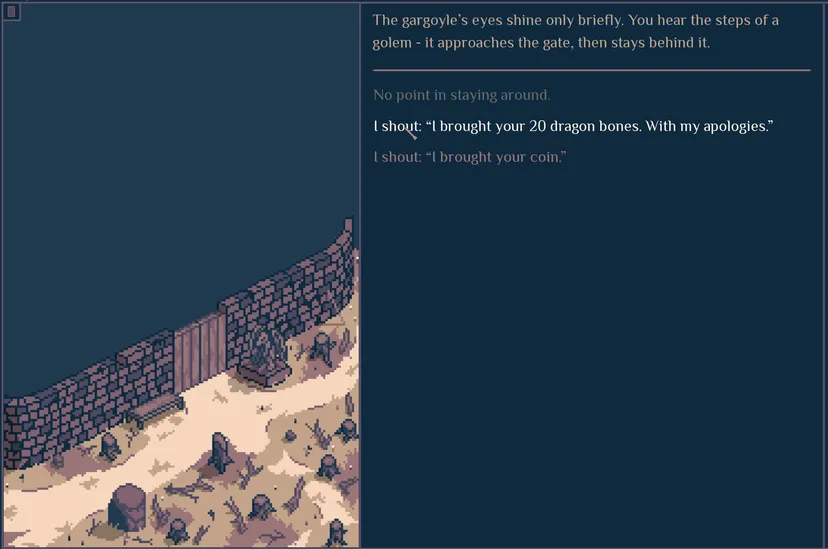
But if the end result is meant to be extra harsh, like an both / or alternative, that is once I consider it as a burnt bridge. An NPC dies or leaves the realm for good; a village collapses; the participant helps one group, however weakens one other. Burning a bridge means the participant shouldn’t count on that placing in additional effort will reverse the end result. Instead, they’re meant to just accept the implications of the modified world.
While some burnt bridges haven’t any constructive outcomes, those who do are extra attention-grabbing. Still, it could really feel synthetic to drive every one in all them to be considerably rewarding.
The pre-written freedom
I needed every scene in Roadwarden to really feel pure, as if it treats the participant’s path because the “canonical”, linear, supposed story, though no such factor exists.
The recreation acknowledges a major a part of the alternatives made by the participant, referencing them and bringing them to their logical conclusion. The floodgates
must be vital no less than domestically, getting talked about each time they’re related and altering to the sport’s programs. The burnt bridges want to go away a mark on the world, affecting the tales and gameplay in main methods. Leading to a village’s collapse may also fail (or resolve) any potential quest tied to it, and can block the entry to retailers and the shelter that it used to supply.
The most necessary burnt bridges have such a significance that even when left untouched, ignored, or deserted, they need to no less than affect the epilogue. In their case, inaction is motion.
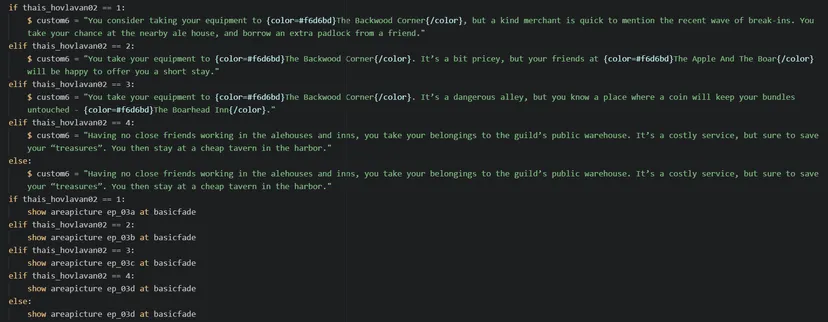
Bringing consideration to the spice and the fluff at each alternative is an not possible problem, nevertheless it’s good to maintain them at hand in your notes, referencing them when writing or enhancing new content material. Even quick callbacks are of nice value as they add to the phantasm that the sport really retains monitor of all the things.
One of the enjoyable components of the aforementioned classes is that they’ve obscure boundaries. The participant can’t know which interactions will result in a butterfly impact, so they should determine how careless or considerate they need to be at any time, getting shocked with the methods the seemingly “pointless” interactions have an effect on their additional journey.
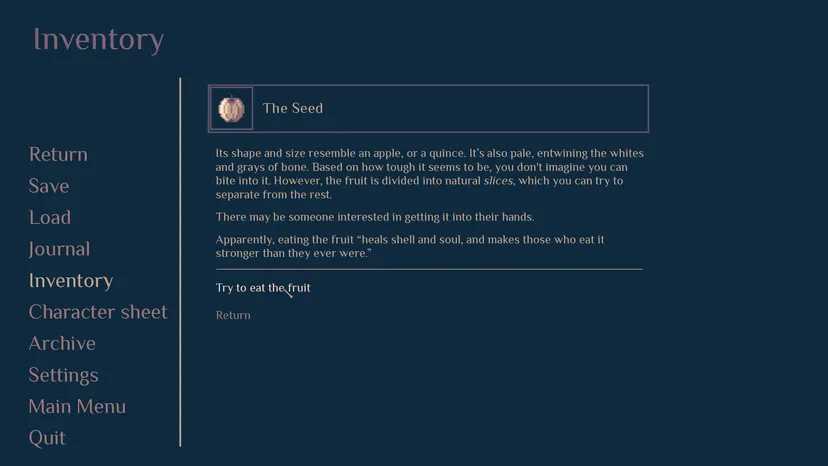
The class, the faith, the non-public objective
Among essentially the most vital floodgates of the sport are the character attributes chosen in the course of the opening part. I didn’t need to deal with them as burnt bridges. The three courses (warrior, mage, and scholar) enable the gamers to obtain or save assets, remedy a puzzle, entry distinctive programs, defeat an opponent, or impress an NPC (due to this fact, they spark their very own spice and fluff), however there aren’t any quests or main plot threads restricted to just one or two of them.
It was necessary to me that no class could be punished for getting picked. The protagonist is considerably good at combating, nice at using, and higher at survival than most. The class
is only a bonus, not the core of their character.
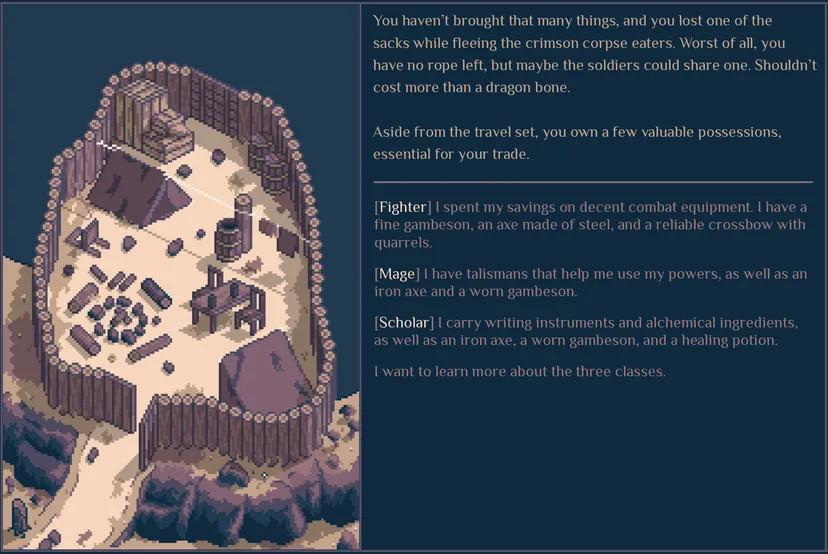
The character’s faith has little impression on fight or the character’s stats, however issues throughout some social interactions, hindering or aiding the protagonist. Depending on the participant’s motion, their faith
will work both as the fluff, spice, or a floodgate, altering the sport extra severely the extra the character follows the teachings of their religion. The PC’s destiny is measured with the alembic.
The private objective is each a spice and a burnt bridge because the participant can’t change it as soon as they choose it at first of the sport. It’s meant to offer the participant with a way of path and trace on the PC’s previous, however is never referenced in dialogues, and has no facet quests tied to it. At the identical time, the way in which the participant approaches their quest is of nice significance each for the character stats and the sport’s epilogue.
Once once more, private quests have a tendency to make use of the alembic—most of them collect obscure factors by finishing interactions or gathering assets. The recreation retains monitor of a few of the participant’s actions and references them upon the hunt completion or within the epilogue, however understanding the various paths the participant can take earlier than reaching the hunt’s finish, I knew I couldn’t do every attainable playthrough the justice, and it was higher to make use of a extra summary device.

The issues
My method wasn’t freed from points, a few of which might have been solved with extra time or higher testing, whereas others put into query the core design and would doubtless find yourself being an effort-sink if I have been to meaningfully enhance them as an alternative of rebuilding them.
I caught to the idea that all the things in Roadwarden is interconnected, with many characters having one thing to say about every necessary matter, and as they added extra data to the pool, I needed to hold all the small print cohesive, or no less than purposely contradictory. It was troublesome to show round from the once-set course. Adding new characters or new story threads was complicating issues even additional.
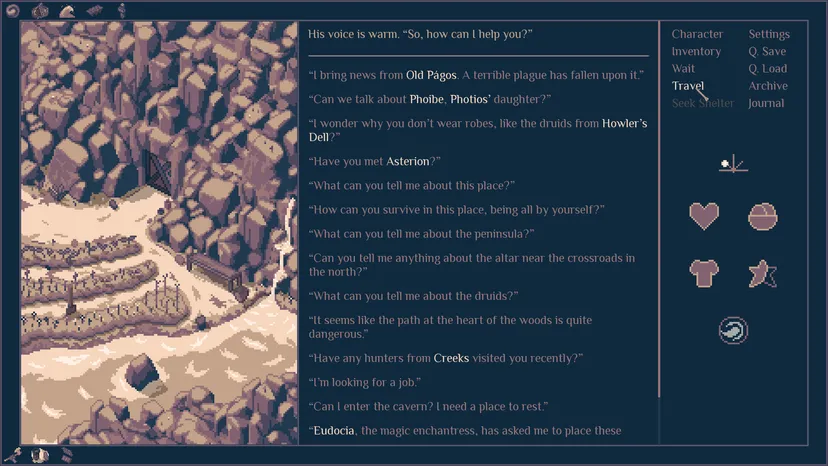
To navigate by all of this, particularly as I used to be scanning the code to see which components of the sport are tied to particular quests or interactions, I used to be compelled to make use of 1000’s of variables, so testing was a nightmare—some interactions require the protagonist to succeed in distant areas and communicate with a number of characters earlier than they’ll push a quest ahead. Even three years in I used to be simplifying my code, studying from earlier errors. In the tip, it labored for Roadwarden, however gained’t match most video games, particularly ones that require enter from voice actors or face animators, or ones that may’t afford to introduce large-scale adjustments years into growth.
It could be simpler to place the villages even additional other than one another and assume that they’re tied solely to their closest neighbors, with some small exceptions. There’s a superb likelihood it could preserve the phantasm simply as properly whereas maintaining the door open for extra quests and interactions with out inviting the flood of compulsory updates every time I attempted to spice issues up.
I already talked about the instance of the altar that eats magic. The “convenient” alembic
misplaced a whole lot of its allure as the sport bought bigger, as I had to hook up with this space each single piece of apparatus. Similarly, the innkeeper who has one thing to say about every NPC, or the one who has one thing to say about every space, required increasingly updates as the sport grew.
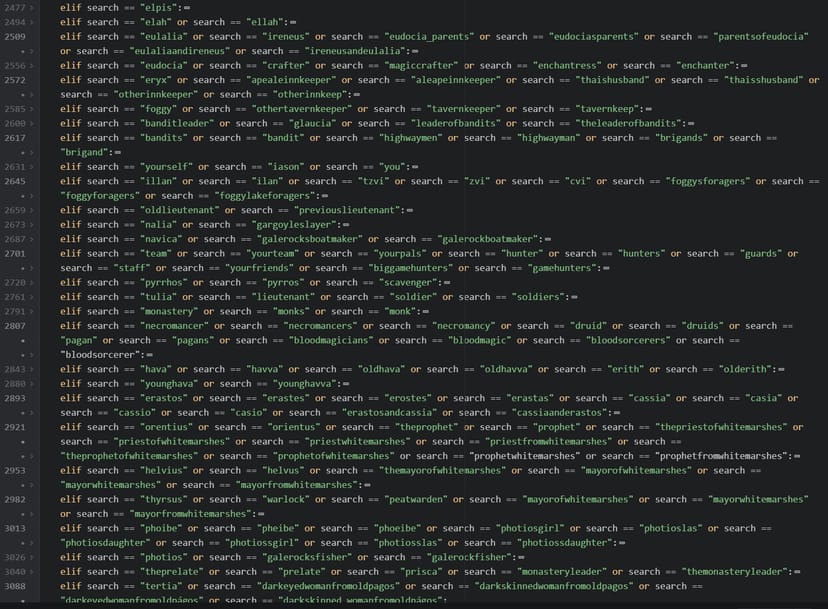
The deadlines introduced their very own limitations. Some of the characters are underdeveloped, missing interactions or duties regardless of their function in bigger quests, whereas the settlements that may be both doomed or saved provide no deeper content material within the case of the latter. There was no time to make serving to them extra impactful, contemplating many gamers wouldn’t attain this a part of the sport anyway.
Between abstractness and vividness
As it’s not possible to make an RPG really natural and fully non-linear, there are components of Roadwarden that needed to be left simplified. The villages are inclined to really feel the identical irrespective of on which day they’re reached. The fluff and spice not often point out the PC’s look, regardless of having an entire system tied to it. I needed to continuously stability between handcrafting all kinds of immersive scenes and distinctive interactions, and utilizing the alembic, sustaining the sport’s basic construction whereas accepting it might generally result in less-than-ideal outcomes, jumps in logic, or awkward simplifications.
After all, except for having the grand desires of constructing a posh, convincing story instructed with the participant’s help, a narrative by which “each choice matters,” there’s additionally one other objective: to truly launch the sport as soon as it will get “Good Enough,” and to present others the chance to expertise it earlier than I burn out.
[ad_2]